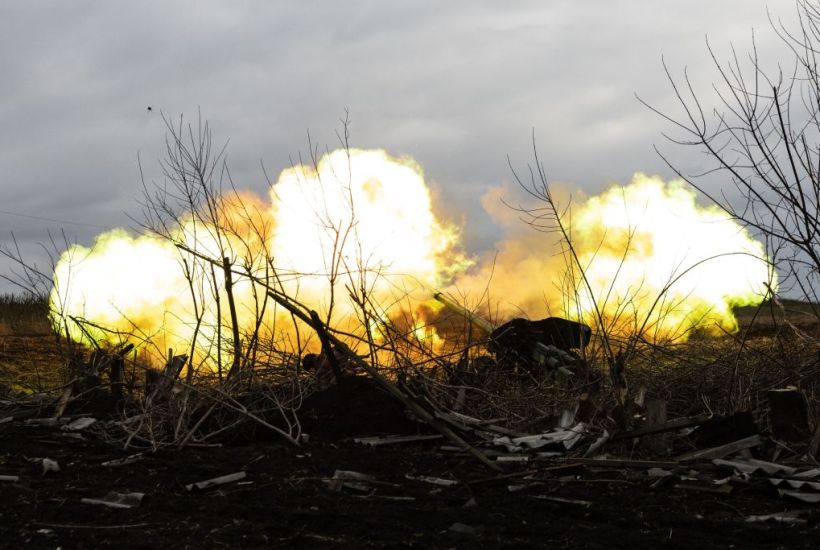Bakhmut is not of immense strategic importance. It’s a backwater, empty of almost all civilian life, and largely in ruins. But the city is where Ukraine’s war of self-defence has been at its most intense for months.
The defenders are suffering, under a hail of artillery fire and under constant threat of attack. But the Russians are losing more. Almost daily, it seems, Putin’s forces advance without cover across a moonscape torn with shell-holes. They are cut down in their tens every time. The front line has barely moved in weeks. Russian bodies, uncollected in the cold, litter the surrounding fields.
To Ukrainians and their allies, these suicidal attacks are no longer simply foolish. They are almost disconcerting. There seems to be no strategy. The Russians appear not to value their forces’ lives, or the small pieces of Ukrainian territory they hope to take.
Wagner does the dirty work of the Russian regime
One cannot talk about Bakhmut without mentioning the Wagner Group and its boss, Yevgeny Prigozhin. It is for his benefit, it appears, that so many have needlessly died. Prigozhin is a thuggish oligarch, a former criminal, who first acknowledged his controlling stake in the Wagner Group during this war, when he became its public face.
The Wagner Group claims to be a for-profit business and a private military company. It is ‘patriotic’, Prigozhin says, but not state-controlled. Most serious analysts no longer believe this to be true.
There are a number of for-profit private military companies. None of them act like Wagner does. Wagner has appeared in wars in Libya, Mali, Syria, and across Africa. It has sent thousands of men to die in Ukraine since 2014.
But it has never done so with an independent spirit. Instead, analysts like Ruslan Trad see the Wagner Group as a not-so-deniable cut-out of the FSB (Russia’s foreign intelligence agency, successor to the KGB) and the military intelligence agency, GRU – with, of course, links to the Russian army, too. In the war in Ukraine, conveniently, Wagner has sprouted its own air force.
In short, Wagner does the dirty work of the Russian regime and its dictatorial allies in the Middle East and Africa. It can only be seen through the lens of Russia’s broader imperial project.
The Wagner group has slowly begun to take over larger and larger parts of Russia’s war against Ukraine. It has collected many former soldiers. It has recruited aggressively from prisons and penal colonies, promising murderers and rapists the chance to kill again, and a dice roll of freedom or death.
Those who retreat, Prigozhin has said in speeches in prison courtyards, will be mercilessly killed by their own comrades. One man who was captured by Ukraine and returned to Russia in a prisoner exchange was executed by his Wagner comrades using a sledgehammer. The murder was filmed, widely disseminated, and Prigozhin endorsed it online.
Prigozhin has his own ambitions. He has been filmed meeting his men – he claims – in Bakhmut itself; he has an active Telegram channel where he recruits and spews vitriol at the Russian ministry of defence and the minister, Sergei Shoigu. He says his men can win the war on their own – although that is hardly what is happening.
One of his most recent videos saw him visit a storage space filled with the bodies of men whom he had sent to their deaths. ‘Their contract is over’, he said, somewhat redundantly.
American officials fear Prigozhin is trying to set himself up as a warlord in order to challenge Vladimir Putin for domestic power. Others say he is preparing himself for when the Russian Federation collapses and he has to fight a civil war, like Leon Trotsky or Admiral Kolchak a hundred years ago. Both ideas seem somewhat fanciful.
Last month, the White House claimed that one of the reasons the Wagner Group has thrown so much away in pursuit of Bakhmut is purely financial. It’s a mining town, and Prigozhin is, according to this account, interested in its minerals.
One of the reasons lives are being thrown away by the thousand in Bakhmut is the pursuit of its nearby salt and gypsum mines. On Telegram this weekend, Prigozhin all but confirmed this theory. Like the White House, he said that Bakhmut has a lot of mines. But Prigozhin put up another view. He suggested a new war, one fought among the tunnels.
He also indicated that the real fight is now for a nearby town called Soledar, which the Russians have been attacking relentlessly for the past week, at what is described by pro-Ukrainian sources as ‘immense cost’. This is where Ukrainian general staff believes the battle will develop next – and where, according to the UK’s Ministry of Defence, Russia is soon likely to gain a foothold.
‘The system of Soledar and Bakhmut mines, which is actually a network of underground cities, can not only (hold) a big group of people at a depth of 80-100 metres, but also tanks and infantry fighting vehicles, which can move about there’, Prigozhin posted on Telegram.
This is absurd. But it is no more absurd than arming criminals without military experience and sending them in human waves to charge well-entrenched defenders over and over again.
Got something to add? Join the discussion and comment below.
Get 10 issues for just $10
Subscribe to The Spectator Australia today for the next 10 magazine issues, plus full online access, for just $10.



















Comments
Don't miss out
Join the conversation with other Spectator Australia readers. Subscribe to leave a comment.
SUBSCRIBEAlready a subscriber? Log in